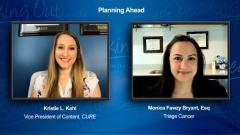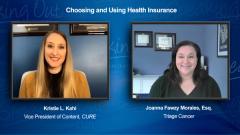
Ways for Patients and Their Loved Ones to Plan Ahead After a Cancer Diagnosis
As part of its Speaking Out video series, CURE spoke with Monica Fawzy Bryant, Esq.,, from Triage Cancer, about planning ahead after a cancer diagnosis.
Episodes in this series
Transcription:
Kristie L. Kahl: After a patient receives a diagnosis, what are some areas in particular that they can and should plan ahead for?
Monica Fawzy Bryant, Esq.: Well, in an ideal world, we would hope that people would do these things even prior to a diagnosis, but certainly it is not too late once a diagnosis has happened. But there are some documents that are really useful to have in place, and along with those documents, the conversations around them. So I think that everyone over the age of 18, there's a couple of legal documents that they should have. That includes a basic will, a power of attorney for financial affairs and an Advanced Health Care Directive. It can be a little bit overwhelming because when you often talk about planning ahead and estate planning, it's emotional. And it can be tough to have those conversations particularly after a serious diagnosis like cancer. But having those hard conversations can really be a very loving thing to do for friends and family.
Kahl: Similarly, we have children, pediatrics and young adults. So if you're a parent or a caregiver of a patient, what are ways that you can plan ahead in that situation?
Bryant: So certainly, if someone is a parent of a minor child or guardian of a minor child, it is imperative to have a will that names a guardian for those minor children, should something happen to themselves. I will also say that where we see people run into challenges is when young adults turn 18. So because then the rules around what parents are or aren't allowed to do for that person change. And so we actually have at Triage Cancer, a checklist on preparing for your child turning 18. And it just has some things to think about some documents that could be useful, should that person want their parent to continue to stay involved? I certainly know, at 18, I was not prepared to take over all of those decisions for myself. And I think that's probably pretty common. I'll also say that even though people under the age of 18 generally can't create these legal documents like a will or an Advanced Directive, it can still be really beneficial to go through the process of documenting your wishes, and having conversations with your loved ones about your wishes around medical care. Because you can't assume that just because somebody loves you, they would make the same decision that you would. And so I think the exercise of creating the documents, even if they're not going to hold up in a court of law can still be really beneficial.
Kahl: Absolutely. And so shared decision making is key throughout a cancer journey. But as you mentioned, those conversations can be difficult. Do you have any advice on how patients can maybe start that conversation with their loved ones?
Bryant: Well, I think this first step is to be comfortable in it yourself. And so to really think through what your wishes are, the whys behind those wishes, I think it can be useful to have a good understanding of before trying to explain it to somebody else. But I also think that when I talk about estate planning to people, I try to take some of the emotion out of it. By really stepping back in recognizing that there is one thing that is true for every single one of us. At some point, every single one of us is going to pass away. That is an inevitable truth at this moment in time. Certainly, we hope that doesn't happen for quite a while. But it is something that's going to happen to all of us. And so if we can start from that premise, it can be helpful in having these conversations about, “What would you want to have happen?” I also think for some people, what's challenging is this feeling of if I write it down, it is there in stone forever, and I can never change my mind. And that's just not true. Every single one of the estate planning documents that we talked about can be altered, changed, amended, revoked. And so as your feelings change as your medical circumstances change, you can absolutely update those documents to reflect your current wishes.
Kahl: Are there additional resources or any kind of educational resources you can offer our patients who are in the middle of a journey or just diagnosed and are trying to plan ahead?
Bryant: Definitely. So on triagecancer.org, we have a resource hub related to estate planning. And if you go to that resource hub, you will see tons of downloadable checklists and quick guides. We have an animated video series that talks about all of the different documents at a very high level, they're only about five minutes long, so not a huge time commitment. We also have a 50-state specific Estate Planning Toolkit. And so it's in three different parts. The first part is general information about the various documents that make up an estate plan and why someone might want to use those. And then parts two and three are specific to each state. So part two will explain the rules for creating the documents in your states. And then part three are the actual fillable forms, if they exist for your state. And so you can go to our website, download those forms, fill them out, and then just follow the instructions about whether you need to have it notarized or signed by two witnesses because every state's a little bit different. But all of that is available for free.
Kahl: What is your biggest piece of advice for patients to negate that feeling of being overwhelmed and encouraging them to plan ahead?
Bryant: So I tend to think that once someone is in the process of creating their estates, those feelings of overwhelm start to actually reduce because once you start putting pen to paper about your various wishes, and what you would like to have happen and have those conversations, it can actually feel cathartic in some ways that it is planned, and you no longer have to worry about those specific pieces, or the what ifs. So my recommendation would be try, just try to start. And then certainly, if you need additional help or support, there are lots of professionals that can be helpful, I have to give a shout out to the phenomenal social workers that are out there doing this work on a daily basis. And they can be a really great source of support, particularly in having those tough conversations, potentially, maybe members of the clergy if you are close with them, but there are people out there that can support you through this process. And I suspect most people will actually feel quite relieved at the end.
Transcription edited for clarity and conciseness.
For more news on cancer updates, research and education, don’t forget to






